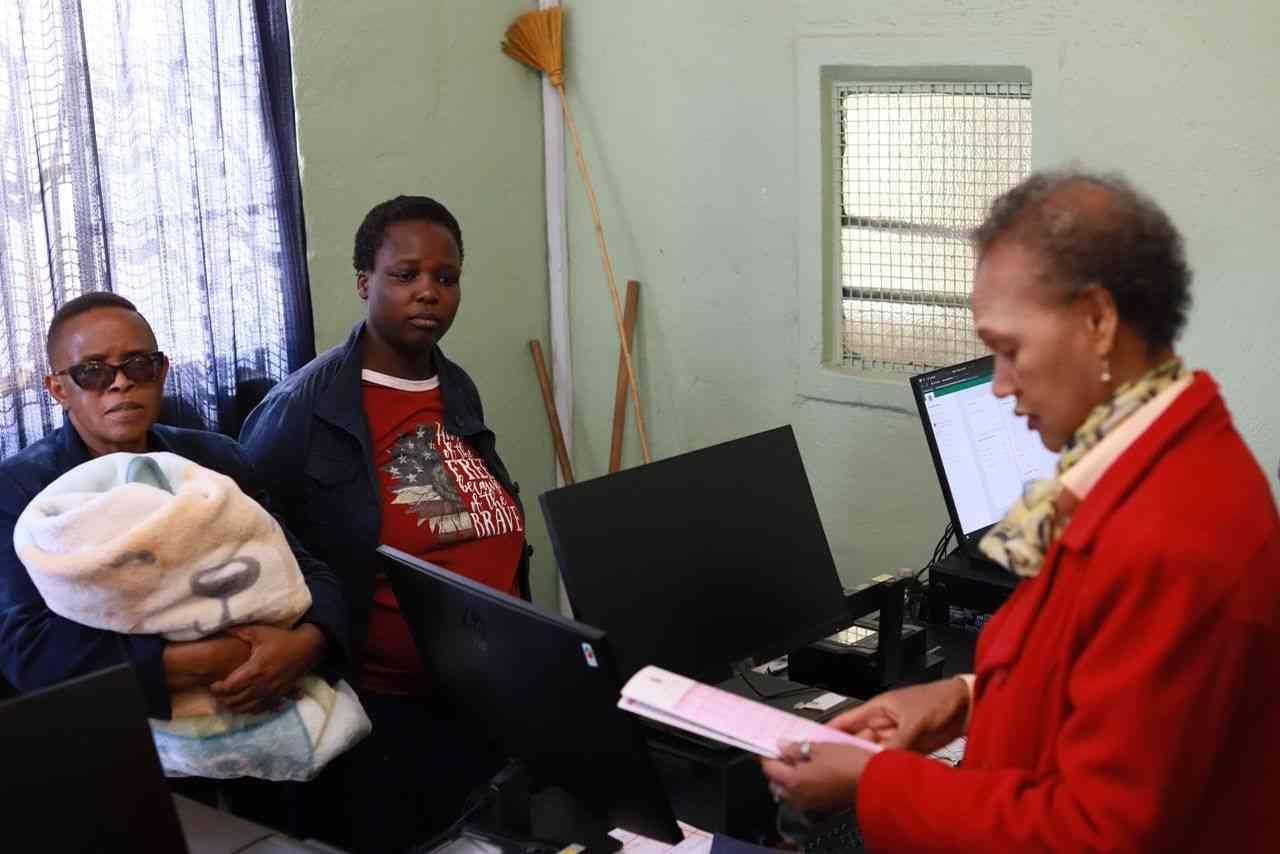By GARY GERALD MTOMBENI
Africa-Press – Zimbabwe. THURSDAY, July 10, brought a wave of hope and relief to Mpilo Central Hospital in Bulawayo, as a steady stream of parents and children gathered to witness a “revolution” in civil documentation.
The air was replete with anticipation, not for a medical procedure, but for things equally vital — birth certificates and national IDs — thanks to a computerisation programme.
This ground-breaking initiative, conducted by the Civil Registry Department in partnership with Unicef and funded by the government of Switzerland, is transforming the way Zimbabweans access essential documents.
Gone are the days of lengthy queues, lost paperwork and the frustrating reality of the issuance of documents being tied to a single, distant registry office.
Mavis Ndadzimidzwa (21), whose face lit up as she received her computerised ID, said the process was quick and efficient.
“I lost my previous ID and came here to get a new one. It took me about 15 minutes to get it. These documents are important as they serve as proof of citizenship,” she said.
Before the introduction of computerisation of documents, the Civil Registry Department relied on a manual system, which was a challenge because some documents would be lost; it would require one to re-apply for another in the district the previous one was obtained.
Computerisation means one can access their documents at any centre around Zimbabwe.
Mpilo Central Hospital has a system that allows the quick registration of newborn babies, as the Civil Registry office is less than 100 metres from the maternity wing.
Godwin Muzhingi (34) and his wife Margot Batch (32), who collected their daughter’s birth certificate soon after her delivery, applauded the computerisation exercise.
“It is clearer having computerised ones than handwritten ones. The computerised one will last longer. It will be clearer in the long run. It will not fade, unlike having it handwritten in ink.”
“A birth certificate is important for children, especially when enrolling for school. It is important to get birth certificates, I advise parents to obtain them as soon as possible and not delay,” they added.
Bulawayo provincial registrar Jane Peters said: “The moment we computerise and put our records in the system, it means that the record is there forever. That means that the record is found everywhere in the country, in any of our Civil Registry offices. That means a person does not have to come back here to get a duplicate
copy.”
“Now, you can obtain it from anywhere else and in real time, because what we do here, we can capture a birth certificate for a person that is in Harare. Like, a person gives birth at Mpilo, moves to Harare, he has not registered a birth certificate, and they just do it there.
“And a person can obtain a birth certificate. So, we can capture things here that can be printed somewhere else, and the hard copy is given to a person who is not here physically, but in another office.”
Peters added that they served more than 200 people in a week.
The programme is being implemented at Mpilo Central Hospital in Bulawayo, Kariangwe sub-office in Binga and Bubi District Registry in Inyathi, and it is enabling digital issuance of birth certificates, national IDs and death certificates, making the process faster, more accurate and accessible.
Binga — Kariangwe sub-office
The computerisation programme was successfully implemented last year in two offices in Binga district, the main office at Binga and the sub-office at Kariyangwe.
Binga district registrar Admire Ngwenya said, “the computerisation at Kariyangwe, has come in handy in terms of bridging a gap, in terms of travelling from as far as Lusulu to Binga, which is 180 kilometres at the cost of a single trip of around US$60 and US$120 to and fro, which has been quite a challenge to our community members and our clients, in terms of accessing these much-sought digitalised documents, which are now easily accessible because of the computerisation of Kariyangwe sub-office.”
“The issue of documentation in Binga was something else back then, but because of the coming in of this computerisation programme, it is coming in as something like an attraction to people. Everyone just wants to have that computerised certificate. It is becoming a push for our clients to come and register, hence bridging the gap of the undocumented,” he added.
Ngwenya added that they expected to have issued around 2 000 computerised documents by the end of the year, as people were eager to access them.
Bubi District Registry in Inyathi
For Evidence Mwinde, a resident in Bubi, but from Binga, the computerisation programme came as a blessing in his life since the company he works for requires him to have computerised documents.
“What made me come here today is that at my workplace they told me I had to computerise my documents for me to continue working, not handwritten.”
“Fortunately, when I came to Bubi Civil Registry office, I found out that they now offered this service. I gave them my papers and they confirmed with Binga district and found that everything was in order. Now I have received my birth certificate and ID without a hustle. This programme has helped me in terms of travelling costs going back to Binga. I have moved closer to my workplace,” he added.
Bubi district registrar Doreen Chikozho said when they set up offices in Bubi district they were not computerised.
“The district wasn’t computerised at all, but through partnership with Unicef, we were computerised last year, I think from June, that is when we started our computerisation,” Chikozho said.
“We’ve been issuing documents before this. We were having our documents processed in Lupane and this was a great challenge for our clients. We had to make more than one trip just to process a document.”
“As it stands, we can just process, as they come and a person will leave with their document when they are going back home. It’s been a great improvement in terms of service delivery and is most welcomed by the community,” she said.
Unicef Zimbabwe’s chief of child protection, Nyasha Mayanga, said the partnership with the Zimbabwean government, supported by the government of Switzerland, to computerise civil registration offices would create a foundation for integrating these services with health care.
“This enhances business processes; they become faster and at the same time, parents are getting digitised copies of birth certificates for their children. I must say that what the government of Zimbabwe has done to decentralise civil registry services to health facilities is a strategic game-changer in terms of driving birth registration rates up,” he said.
“As you are aware, according to the latest Zimbabwe demographic and health survey, the birth registration rate for the 0-5 nationally stands at 57% and with this computerisation we are projecting an increase in that rate to even higher levels, the goal must be to ensure universal birth registration in the country.
“Our desire and advocacy is to ensure that the maternity hospital and the civil registry systems are digitally connected so that birth confirmation records generated from the maternity hospital are automated and picked up by the Civil Registry Department for the registration process.”
Source: NewsDay
For More News And Analysis About Zimbabwe Follow Africa-Press






